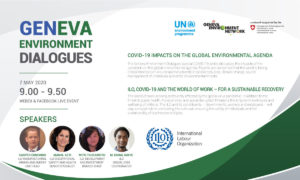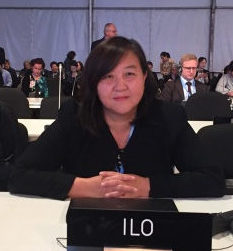Événement Conférence
GENeva Environment Dialogues | ILO, COVID-19 and the World of Work – For a Sustainable Recovery

The world of work is being profoundly affected by the global virus pandemic. In addition to the threat to public health, the economic and social disruption threatens the long-term livelihoods and wellbeing of millions. The ILO and its constituents – Governments, workers and employers – will play a crucial role in combating the outbreak, ensuring the safety of individuals and the sustainability of businesses and jobs.
About the GENeva Environment Dialogues
The GENeva Environment Dialogues’ special COVID-19 series discusses the impacts of the pandemic on the global environmental agenda. Experts are concerned that the world is losing critical time to turn around alarming trends in biodiversity loss, climate change, sound management of chemicals and other environmental threats.
The series addresses the following topics:
- The impact of the crisis on the invited organization activities
- The response of the invited organization to the COVID-19 crisis
- The impacts on the preparations of the conferences and negotiations they are hosting
- New schedules and programmes for these conferences and negotiations
Speakers
Facilitators: GEN Team

Casper EDMONDS
Head, Manufacturing, Mining and Energy Unit, Sectoral Policies Department (SECTOR), ILO

Manal AZZI
Senior Specialist on Occupational Safety and Health, Labour Administration, Labour Inspection and Occupational Safety and Health Branch (LABADMIN/OSH) , Governance and Tripartism Department (GOVERNANCE), ILO

Mito TSUKAMOTO
Branch Chief, Development and Investment (DEVINVEST), Employment Policy Department, ILO

Moustapha Kamal GUEYE
Coordinator, Green Jobs Programme, Enterprises Department (ENTERPRISES), ILO
Summary
Opening remarks
Moderation by: Diana Rizzolio, Coordinator, Geneva Environment Network
The Geneva Environment Network has the pleasure to welcome you today virtually for a new session of the Geneva Environment Dialogues, focused on the impacts of the COVID-19 pandemic on the global environmental agenda. This new series of events will take place bi-weekly and is aimed at keeping you informed on the latest developments of major upcoming negotiations.
The COVID-19 pandemic is a crisis that affects everyone and there is a large response from the UN system and other actors to this crisis, including on the global environmental agenda, as we have heard in the previous sessions of this series of events we are hosting.
As the Secretary General of the United Nations, Antonio Guterres, said, the COVID-19 pandemic has exposed the fragility of our societies and economies to global shocks, such as disease or climate disruption. As we recover, we must build back better for people and for the planet.
The Secretary General keeps reminding us, that have a framework for action – the 2030 Agenda for Sustainable Development and the Paris Agreement on Climate Change.
When taking his role last week as UN Special Rapporteur on extreme poverty and human rights, Olivier De Schutter, said, as did numerous experts around the world, that the economic recession caused by the COVID-19 pandemic underscores the need to invest heavily in a greener economy to create jobs and reduce inequalities.
Today we are discussing COVID-19 and the world of work, profoundly affected. The International Labour Organization and its constituents play a crucial role in combating the outbreak, ensuring the safety of individuals and the sustainability of businesses and jobs. As we will shortly hear from our ILO colleagues, that we have invited today. This morning we have with us four experts from four different departments of the International Labour Organization, whose regular activities contribute to the global environmental agenda.
ILO, COVID-19 and the World of Work
Mito Tsukamoto, Branch Chief, Development and Investment (DEVINVEST), Employment Policy Department, ILO
- Updated estimates on impacts of COVID-19 on the World of Work – ILO COVID monitor
- COVID damage to livelihoods, particularly among the working poor of the informal economy
- Countries facing instability from conflicts, political instability or environmental degradation are coping with large populations of unemployed, working poor and informal sector workers
- COVID in these conditions made millions “double casualties”
- 68% of workers are in countries with mandatory or recommended workplace closures
- Working hours declined by 4.5% in the first quarter of 2020
- Lower- and middle-income countries expected to register the highest rate of work hour loss
- Informal workers are one of the most vulnerable in the labour market – 1.6 billion informal workers impacted by lockdown measures
- Assessment of COVID-19 impacts on a programme offering jobs to Syrian refugees in Jordan
- Two key conclusions:
- Need to address pre-existing labour market challenges
- 47% of respondents who were employed before COVID-19, found themselves out of work (13% permanently dismissed, 18% temporarily laid-off, 16% paid leave) – 33% of Syrian refugees lost their job compared to 17% of Jordanians
- Estimated 60% decline of income by informal workers
- 4 pillar solution:
- Stimulating economy and employment
- Supporting enterprises, jobs and incomes
- Protecting workers in the workplace
- Relying on social dialogue for solutions
- Importance of bridging short-term measures with long-term measures to build back better
Casper Edmonds, Head, Manufacturing, Mining and Energy Unit, Sectoral Policies Department (SECTOR), ILO
- Impact of the pandemic differs from sector to sector
- New heroes are health and public energy services workers
- Resilient systems and always prepared for a pandemic
- New heroes include workers in transport, education, sanitation, waste management
- High risk of infection, but essential for society – they often do not enjoy good conditions of work
- Women are overrepresented in the most affected sectors
- Migrants workers are very vulnerable – often out of work and unable to go home – important to protect them
- Some sectors are hit harder than others (civil aviation, tourism, culture, transport and shipping, …)
- Supply chains grind to a halt when workers stay home and borders close
- Seafarers are home or caught in their ships
- 4 pillar solutions, but the key is that the response must be urgent, well-coordinated and on a global scale
- Sectorial constituents – need for immediate and better targeted relief in hardest hit sectors and low-income countries
- Ensure safe working practices are essential to prevent and control the pandemic
- ILO Director-General Guy Rider called for immediate and human-centred response
- All stakeholders (governments, employers, workers, investors, consumers) have to come together to find solutions together
- One example is the call for action of the garment and textile sector unions and companies to save lives, keep enterprises afloat and protect jobs and livelihoods
- ILO will continue to work with Member States and sectorial constituents to find solutions on how we can build back better
- Just transition and circular economy are dimensions that will be particularly focused on
Manal Azzi, Senior Specialist on Occupational Safety and Health, Labour Administration, Labour Inspection and Occupational Safety and Health Branch (LABADMIN/OSH), Governance and Tripartism Department (GOVERNANCE), ILO
- Safety and health at work is crucial for the safety of workers and to limit and mitigate further spread – protection of families and communities
- Main Occupation Safety and Health (OSH) risks:
- Contagion risks: essential workers, who are in contact with infected patients or with the general public + workers in contact with contaminated materials and surfaces
- Environmental risks: associated with single-use items such as PPEs, as well as the individualization of transport and waste management
- Psychosocial risks: fear of infection, job insecurity, lack of OSH measures, isolation, increased workload, multiple burdens (work, chores, care, schooling), stigma, violence, difficulty in self-care
- Ergonomic risks: handling of loads, inadequate home equipment
- Chemical risks: disinfectants become key element to prevent contagion – risk for health of workers who are in constant contact with those chemicals
- Workplace risk assessment and control both for business continuity and return to work
- Every risk assessment needs to consider contagion risks as well as the other risks that might arise from a decision
- Instead of PPEs, better to focus on engineering and administrative controls for physical distancing – encourage social distancing
- Adapt control measure based on the risk of exposure
- Workers’ participation in the OSH measure to prevent contagion is essential
- Collaborative and participative approach is crucial
Mustapha Kamal Gueye, Coordinator, Green Jobs Programme, Enterprises Department (ENTERPRISES), ILO
- Capacity to respond in a drastic manner when there’s the will to do that
- Governments took unthinkable measures
- Environmental agenda can be put forward in a drastic manner and ambitious actions can be taken
- Response to COVID-19 must go hand-in-hand with environmental responses
- Not going back to a new normal, going back to a better normal
- ILO initiative to support constituents in responding to the crisis from an employment perspective, but also putting forward the agenda for environmental action – Climate Action for Jobs Initiative
- Choose a new path – of climate action, of well-being for people and planet, about people’s jobs, health, education, opportunities and future
- A social, governmental, business answer to a crisis that is about getting back to work, about education, about health and the healthcare sector, about building back better
- With Climate Action for Jobs, ILO is engaging with countries to help them at the national level, through interventions helping policy measures that facilitate the just transition
- How can we sustain gains we had when the economy was at a standstill over time?
- Looking at key sectors – building skills, social protection and enterprise development policies
- Rally international financial organizations and regional development banks to invest (in energy access for instance)
- Crisis gave a strong sense of the need for decentralised energy systems – renewables and other solutions can offer that
- Opportunity to get back to a better normal
M. Tsukamoto
- ILO Director-General spoke about a better normal, that’s what we are aiming for
- Measures put in place to respond to COVID:
- short-term: ensure health and safety, help the most vulnerable
- long-term: sustainable economic recovery + building back better
- Jobs, Peace and Resilience flagship (JPR) – created through social dialogue within ILO – combines:
- employment intensive investment
- technical vocation and entrepreneurial skills training
- local economic development approaches
- Half a century of experience in implementing employment intensive investments, delivering public goods, public works and green works
- On environmental works, offering jobs and income to workers who contribute to environmental preservation, improvement of natural resources management, reduction in greenhouse gases emissions, and climate change adaptation and disaster risk resilience
- These measures contribute to building a more resilience society
- Advantages of green works:
- 25 to 70% of investment is spent on wages and incomes
- 2 to 5 times more jobs can be created
- 10 to 30 % more cost effective
- Optimize use of local available resources – creating a local multiplier effect (that drives up local growth)
- Better quality standards
- Improve income distribution and enhance social protection
- More labour intensive
- Focus on capacity development (offering skills and training, not only jobs)
- Strong sense of local ownership
- Important to consider now the long-term sustainability of jobs
Questions
Bill Salter, TRRA
- We haven’t heard much on social dialogue but the urgency to act risks sidelining views of employers and workers and reducing existing protections. What good lessons have been learned?
Snehal Amdekar, Technodeal Enerpower Pvt Ltd
- MSMEs usually don’t have proper workforce/talent to assess workplace risks and hence are at major risk. How can they be helped? Particularly in developing countries.
Maria Gonzalez, Permanent Mission of Mexico to UN in Geneva
- Firstly, we would like to thank Geneva Environment Network for these dialogues. Secondly, I would like to ask if ILO has any recommendations or guidelines for enterprises and governments, to encourage them to keep home office in a sustainable way.
Shrimant Rathod, Bhavan’s Hazarimal Somani College
- What precautions will governments take to compensate the effect of COVID-19?
Sonia Pena, IUCN
- How do we ensure coherence across the board in the “Green recovery agenda” post-COVID when so far countries have been responding to this crisis on an individual national (and sometimes state by state) level?
Eve (former UNECE)
- What we are lacking is any kind of framework or organising principles. How do we best make decisions to optimise the outcomes that we already want? We actually need to take a step back and look at the bigger picture, to think about the system and what we have already committed to.
- As we ramp up relief efforts, we also need to ensure we are being strategic about optimising our longer-term recovery. This means taking a systems-level approach to considering interrelated crises at domestic level- such as those of wealth inequalities, family violence, climate and ecological crises, that have been present long before COVID-19 and now risk being intensified.
Damián Galván Rodríguez
- Do you foresee a potential risk of shrinking salaries and precarization due to the increase of remote working? How to tackle it? Measures?
Answers
M. Azzi
- Social dialogue from OSH perspective is key
- Tripartite guidance on the return to work is successful and clear – negotiation and consensus on the requirements to return to work create great, sustainable guidelines
- Tripartite dialogue at the hearth of business continuity and return to work guidelines
- In the Health of Work report, there is a section on informal economy and on MSME, which have been to reach with communication
- National mechanisms to reach MSME on the topic of OSH are crucial – also because sectorial specificity is essential
- Successful programs based on governments assigning clear budgets + using regional intermediaries to get to specific MSME (sectorial unions, regional governments, …)
- Public and occupational health have to work together
C. Edmonds
- Increased activities on joint statements, calls for action
- 50 statements to shape the industry for return to work
- More in maritime and shipping – develop concrete measures for seafarers to get home and to return to work
- MSME do not always have the resources of large companies – ILO has developed specific tools for MSME
M. Tsukamoto
- Need to look in the long-term: environmental degradation affects food security, water security, conflicts, tensions, inequality, …
- Offering jobs that preserve and restore the environment, we reverse the negative effects of environmental degradation
- The environmental and the economic argument mutually reinforce themselves
- In the long-term, we need to work together to build back better, not just go back to a new normal, but to a better normal
K. Gueye
- There is an ILO brief on how the crisis is being addressed in the context of MSME, as well as a number of tools available
- Some of them are formal, but many are informal enterprises – how has the crisis affected those that cannot benefit from government relief?
M. Tsukamoto
- The pandemic is showing the importance in multilateralism
- The importance of stopping to look in regional and national silos
- Need to look holistically and work with other countries, sectors, agencies
- Social dialogue – bringing in governments, employers and workers – is extremely important
C. Edmonds
- Question about policy coherence – example of the automotive industry:
- Struggling industry, COVID-19 hit and sales dropped – car makers are going broke and workers are laid off
- Industry slowly moving towards greener production (e-vehicles)
- What kind of auto industry we want in the future?
- Stimulus packages to recover and go back to normal or bring about a greener, more inclusive industry?
- We need to use stimulus packages to build back better and greener
M. Azzi
- In the context of remote working or working from home, ILO has developed guidance to ensure that salaries and working hours are not affected
- For those who can’t work remotely, ILO calls for the protection of their salaries and of their jobs
- ILO has guidance on general social protection
- ILO has ergonomic guidance to set up a home office
Closing remarks
K. Gueye
- Call for collective and coordinated response
- Some areas – Europe – governments, civil society, and business groups are coming together for green recovery
- Citizens saw their government act to address existential threat, COVID-19, and climate change should be addressed decisively as well, as an existential threat to humankind – governments have the capacity to act decisively
- Hope that we have a healthy environment and a sustainable economy
Questions not directly addressed during the livestream
1. Ye Ko Ko Htet
- Sectors that are labour intensive and mostly occupied by women are threatened by not only losing jobs but also decreasing incomes. The tourism sector is also suffering. In Myanmar, it is predicted to last until 2023.
- From past the histories, global financial institutions sometimes advised the governments to inject the investment in infrastructures that will lead to structural change in the labour market. In addition, men have more privileges to get employment in this sector. For developing/poor countries, borrowing money to treat the economy is very important and it usually requires following the preference of these financial institutions.
- Decision to inject government spending to the infrastructures may have much impact on the environmental issues especially with the construction sectors.
- Is there any guidance/advice on structural change from the point of environmental issue?
- What are the experiences from 2009 financial crisis?
Answer: The relative importance of the construction sector in different countries varies widely, but in general represents between 4 to 15 % of GDP. According to ILO estimates, the sector employs 7.6 % of the global workforce . While the ILO has assessed that the global impact on the sector as medium , this will vary by country, and in those countries where the sector is relatively large the impact on workers and the small business in this sector may be severe. From a recovery perspective, the sector has important advantages as it is relatively labour-intensive, can be targeted at geographic areas that are particularly affected and in most countries has a large share of local inputs. It must be recognized however that the structure of infrastructure stimulus packages influences immediate employment creation as well as long-term inclusive development, and thus it contributes to the goal of “building back better” . They can take advantage of both public and private investments. For the impact of women in the infrastructure sector, click here.
2. Jan Dusik
- How do you plan to facilitate creation of green jobs in the current very short time window when governments approve recovery packages, which will determine public financial incentives for quite a long time? i.e. to avoid the temptation to go back to where we were, as this seems simplest
Answer: There is a need to make the economic argument of how green jobs / green works can have multiple wins (e.g. addressing poverty, inequality, offering jobs and incomes while protecting the environment and building climate resilient infrastructure). Further explained below.
3. Cian Mulligan
- Good morning Mito, great presentation. Regarding Green Jobs: green initiatives are very dependent on government incentives and investment. Do you see this as a priority for governments in the post-pandemic period?
Answer: On potential structural change benefits from the point of environmental issues and the need for this to be a priority of governments post-COVID …. Infrastructure stimulus packages could prioritize green works that should be spread over the entire range of green investments, from household level interventions such as installation of domestic renewable energy systems, to ecosystem restoration and climate change adaptation. This would be win-win offering jobs, income to those that most need it and being able to contribute to a more sustainable future. For example, focus can be on natural resource management using nature-based solution, or irrigation systems to increase agricultural productivity, etc. Check more here
4. Bill Salter
- We haven’t heard much on social dialogue but the urgency to act risks sidelining views of employers and workers, and reducing existing protections. What good lessons have been learned?
Answer: ILO Conventions and Recommendations are discussed and adopted by member states through social dialogue – See relevant Employment and Decent Work for Peace and Resilience Recommendation, 2017 (No. 205) , Transition from the Informal to the Formal Economy Recommendation, 2015 (No. 204), Employment Policy Convention (No.122), Social Protection Floors Recommendation, 2012 (No. 202)
Documents
Video
The event will be live on Facebook.
Links
- ILO: COVID-19 and the world of work
- ILO Green Jobs Programme
- ILO Development and Investments
- Press Release: Helping the “double casualties” of COVID-19
- Policy Briefs
- Guidance and Technical Notes:
- The Guidance Note Considerations for Employment-Intensive Works in Repose to COVID-19
- The Technical Note COVID-19 – Job Creation through Employment Intensive Public Works Programmes
- The Guidance Note on Guidance Note to JPR programmes
- The Guidance Note/ToRs on How to mainstream social cohesion and peace into COVID-19 socio economic impact assessments available in French and English
- Resource Pages (link to country responses):
- ILO Occupational Health
- Prevention and Mitigation of COVID-19 at Work ACTION Checklist
- Press Release | World Day for Safety and Health at Work 2020 – Stop the pandemic: Safety and health at work can save lives
- Report for World Day for Safety and Health at Work 2020
- Webinar recording: Stop the pandemic: Safety and health at work can save lives
- Good jobs to minimize the impact of COVID-19 on health inequity
- Work at the sharp end: Human factors/ergonomics for protecting healthcare workers and patients
- Work from home: Human factors/ergonomics considerations for teleworking
- Covid-19: How do OSH professionals impact public-policy
- The new world battleground with Covid-19: Challenges, partnerships, impact and business
Small and medium enterprises (SMEs)
